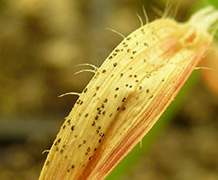
Alarmingly, Zymoseptoria tritici is becoming increasingly resistant to fungicides and already accounts for about 70% of annual European fungicide use.
Exeter researchers lead international initiative to face devastating crop disease
Wheat is the most widely-grown crop in the world and is worth around £1.8 billion to the UK economy.
The cost of losses from Septoria tritici blotch (STB), a disease caused by the fungal pathogen Zymoseptoria tritici, to the UK economy can vary from £89 million to £180 million depending on the severity of the infection.
Alarmingly, Zymoseptoria tritici is becoming increasingly resistant to fungicides and already accounts for about 70% of annual European fungicide use, worth around one billion Euros.
Professor Sarah Gurr, from Biosciences, estimated that the disease could cost the economies of France, Germany and the UK, the three main EU wheat growing countries, between €120 and 700 million.
With financial support from the Biotechnology and Biological Sciences Research Council (BBSRC), Exeter researchers have now started an international initiative to face this challenge to our food security. Based on the research activity of several groups in Biosciences, including Professor Gero Steinberg, Professor Ken Haynes, Prof. Sarah Gurr, Dr David Studholme, Professor Nick Talbot, the international journal Fungal Genetics and Biology is dedicating its entire June 2015 issue to STB and Zymoseptoria tritici.
This special issue is edited by Prof. G. Steinberg, who collated 17 articles from Exeter (10 from his own laboratory) and additional 11 articles from numerous other research groups located all over the world. It is entitled "Understanding Septoria tritici wheat blotch: Tools and techniques to study pathogenicity in Zymoseptoria tritici" and provides an overview of the current knowledge of the fungus and its pathogenic potential. Papers in the issue highlight the economic impact of STB on wheat, our current knowledge of the cell biology and genome organisation in the fungus and the host-pathogen interaction, followed by articles introducing techniques and molecular tools to study STB. In total contributions have been made by 65 authors from 25 institutions, both in academia and industry, from 10 countries: United Kingdom, USA, Netherlands, Iran, Tunisia, Germany, France, Ireland, Switzerland and Australia.
Professor Nick Talbot, Deputy Vice Chancellor for Research and Knowledge Transfer, at the University of Exeter said: “This study highlights the constant need for fungicide discovery, particularly in the face of emerging resistance to existing products by the fungal pathogen Zymoseptoria tritici. This special issue has brought together international perspectives from both industry and academia so that together we can develop sustainable control mechanisms of STB.”
Professor Gero Steinberg, from Biosciences at the University of Exeter, who coordinated the special issue of Fungal Genetics and Biology said: “The fungal pathogen Zymoseptoria tritici poses a real threat to wheat production. In times of changing climate and a growing world population, Exeter research takes responsibility and joins the world-wide quest to understand the biology of this fungal pathogen. However, it is important to note that this only possible with help from the BBSRC, who continuously supported all participating UK laboratories in their research on plant pathogens and, in doing so, shapes the future of UK agriculture”.
Date: 11 June 2015
